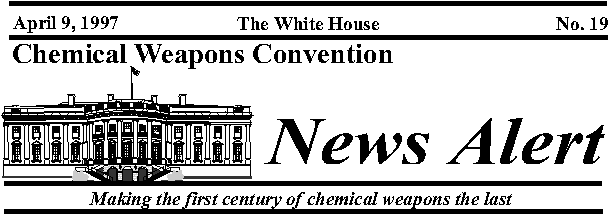This is the second in a series of News Alerts that look at the facts, not the fictions,
about the Chemical Weapons Convention. Over the past three and a half years, the Senate has
held 15 hearings on the treaty, with more hearings scheduled. The Administration has
conducted dozens of briefings for Senators and their staff, and provided the Senate more
than 1,500 pages of information on the CWC.
The Burdens on Business Fiction: Business opposes the treaty because it will impose huge
reporting and inspection burdens on thousands of American companies that use chemicals
regulated by the Convention.
The Facts:
- The chemical industry, which worked closely with the Reagan and Bush Administrations during
the CWC negotiations, strongly supports ratification. The Chemical Manufacturers Association
(CMA), the Synthetic Organic Chemical Manufacturers Association (SOCMA), the Pharmaceutical
Research and Manufacturers of America (PhRMA) and other major trade organizations support
the CWC and say it will not pose an undue burden on business. Small business, through the
National Federation of Independent Business (NFIB), called treaty opponent�s claims that it
opposed the treaty �100% incorrect� (Wall Street Journal, 2/14/97). An NFIB official
predicted its members �are not going to be impacted.�
- Under the CWC, about 140 companies will likely be subject to routine inspections and more
detailed reporting requirements. Many are members of CMA, which strongly supports the CWC.
The rest of the businesses covered -- approximately 1,800 companies -- are producers of
large volumes of covered chemicals -- not, as misinformed critics allege, users of chemicals
like soap and paint makers.
- More than 90 percent of the industry facilities covered by the treaty will be required to
do little more than fill out a two-page form once a year. Moreover, we expect that
challenge inspections in the U.S. will be directed largely at military facilities.
- What the critics fail to point out is the cost to
|
American business if we fail to ratify.
The CMA has estimated that
up to $600 million a year in sales by American chemical companies and many jobs will be at
risk from mandatory trade restrictions designed to pressure rogue states to join.
The Cost Fiction: American taxpayers will bear substantial annual costs of membership.
The Facts:
- For fiscal 1998, the Administration has requested $25 million for meeting our CWC
assessment and an additional $21 million for multilateral verification at U.S. chemical
weapons-related facilities, should that be necessary. That amounts to about 20 cents from
every American. This is a far cry from the $200 million pricetag critics cite without
basis. Less than a quarter from each American is a small price to pay to improve the
safety of our troops on the battlefield and our citizens at home -- and a bargain compared
to the losses American business could incur if we fail to ratify.
The Trade Secrets Fiction: It could jeopardize confidential business information
through frivolous �challenge inspections� with extraordinary access to files, data and
equipment; inspectors themselves could be spies.
The Facts:
- The Chemical Manufacturers Association, which strongly supports the CWC, helped write
the rules covering confidential business information -- protecting trade secrets was its
top priority during the treaty negotiations. Then, CMA �test drove� the treaty during
seven full-fledged trial inspections at chemical facilities to make sure protections against
industrial espionage were strong. They are.
- Further, the treaty gives our government the right to reject ahead of time for any
reason any inspectors we believe may try to spy at U.S. facilities.
- Fearmongering about the treaty�s draconian inspection tools is ironic, given allegations
by opponents that the treaty is unverifiable -- which is it, too tough or not tough enough?
Tomorrow: The Rogue States Fiction. |


